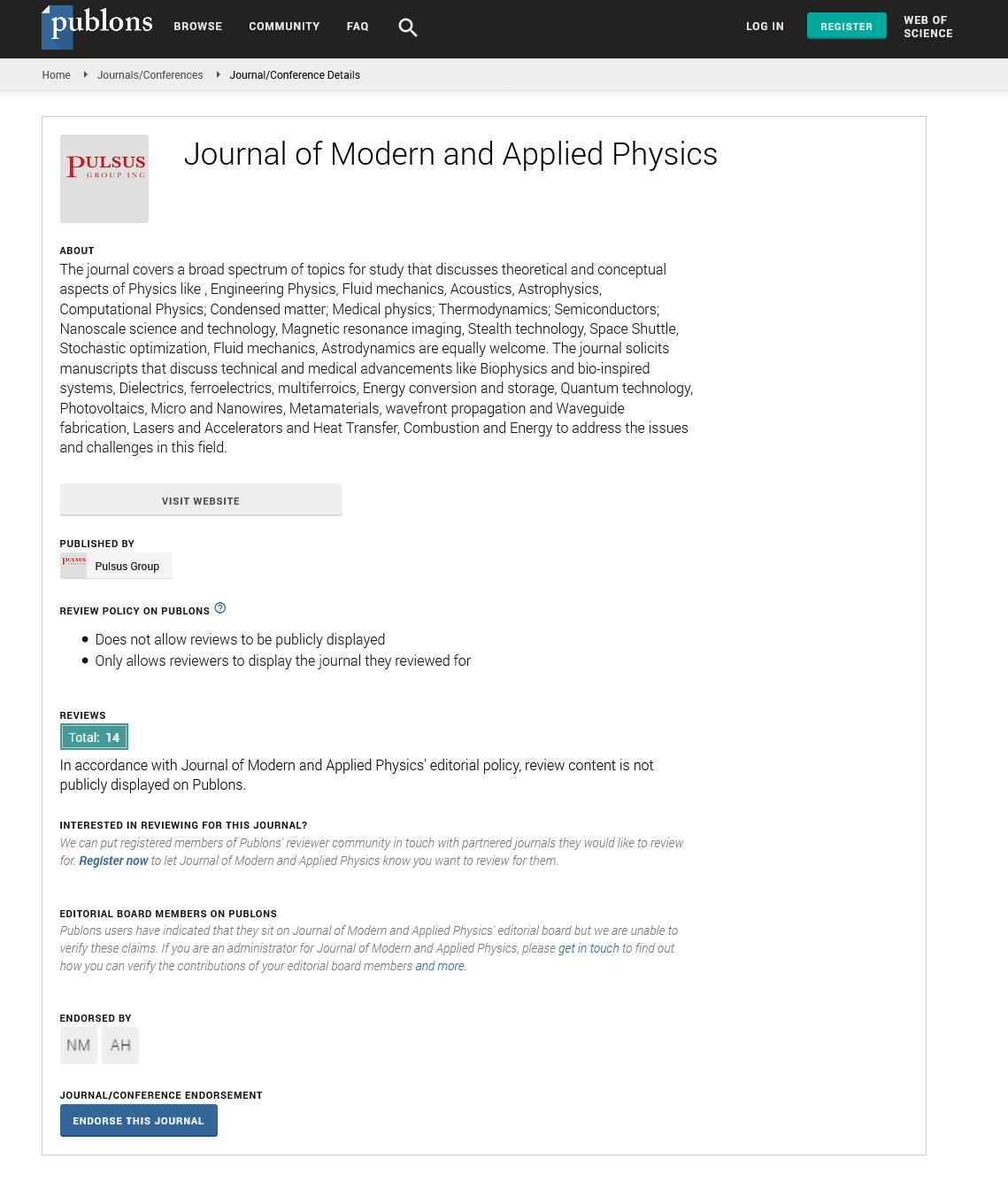The relationship between gravity and velocity of light
Received: 14-Jun-2023, Manuscript No. puljmap-23-6518; Editor assigned: 26-Jun-2023, Pre QC No. puljmap-23-6518(PQ); Accepted Date: Jul 08, 2023; Reviewed: 29-Jun-2023 QC No. puljmap-23-6518(Q); Revised: 04-Jul-2023, Manuscript No. puljmap-23-6518(R); Published: 10-Jul-2023
Citation: Zhang W. The relationship between gravity and velocity of light. J Mod Appl Phys. 2023; 6(3):1-5.
This open-access article is distributed under the terms of the Creative Commons Attribution Non-Commercial License (CC BY-NC) (http://creativecommons.org/licenses/by-nc/4.0/), which permits reuse, distribution and reproduction of the article, provided that the original work is properly cited and the reuse is restricted to noncommercial purposes. For commercial reuse, contact reprints@pulsus.com
Abstract
he classical Newton formula  reveals the law of gravity of celestial bodies and everything, but does not explain the cause of gravity. General relativity says that gravity doesn't exist, but is a curvature of spacetime. Quantum mechanics suggests the existence of so-called gravitons, but so far none have been found. Quantum mechanics can't explain gravity, relativity can't explain quantum mechanics, and gravity and electromagnetic theory are still not unified. It is pointed out that the gravitational constant
reveals the law of gravity of celestial bodies and everything, but does not explain the cause of gravity. General relativity says that gravity doesn't exist, but is a curvature of spacetime. Quantum mechanics suggests the existence of so-called gravitons, but so far none have been found. Quantum mechanics can't explain gravity, relativity can't explain quantum mechanics, and gravity and electromagnetic theory are still not unified. It is pointed out that the gravitational constant  is PI, c is numerical value of velocity of light. The essence of gravity is the fluctuating pressure of particles in a vacuum.This paper is also an attempt to unify the theories of gravity and electromagnetism.
is PI, c is numerical value of velocity of light. The essence of gravity is the fluctuating pressure of particles in a vacuum.This paper is also an attempt to unify the theories of gravity and electromagnetism.
Key Words
The gravitational constant;velocity of light;Vacuum fluctuation; Particle pressureIntroduction
The formula for Gravitation:
Newton's formula for gravitation:

G is the gravitational constant.
Between two objects (particles), gravitation is proportional to the product of the mass and inversely proportional to the square of the distance. Let us suppose is  PI, c is numerical value of velocity of light. The dimension of c is the reciprocal of the gravitational constant G.
PI, c is numerical value of velocity of light. The dimension of c is the reciprocal of the gravitational constant G.

Due to the influence of the atmosphere, the current experimental value of the gravitational constant G is bigger than normal.
The relationship between gravity and the density of celestial body
Let the mass of the earth be M, the radius be r, and the mass of an object on the earth be m,

The acceleration of gravity at the Earth's surface 
 is the average density of the earth,
is the average density of the earth,  is the density pressure of the earthï¼?
is the density pressure of the earthï¼? is the earth's particle pressure That's the difference of infinity.
is the earth's particle pressure That's the difference of infinity.
particle pressure = density pressure c is numerical value of velocity of light.
c is numerical value of velocity of light.
That is, the two are multiples of Light speed value.
The particle pressure of the Earth is numerically equal to the acceleration of gravity at the surface of the Earth.
Let the density of the earth 5520 Kgm-3, The radius of the earth r 6370000 m The acceleration of gravity at the Earth's surface

For any celestial body with constant radius r, the higher the density, the greater the acceleration of gravity, the greater the gravity.
For any celestial body, the higher the density pressure, the greater the gravitational acceleration, the greater the gravity.
If this object m is 2r from the center of the earth, the density pressure is 1/4 of the original pressure,  Its centripetal acceleration is also 1/4 of the original.
Its centripetal acceleration is also 1/4 of the original.
Its centripetal acceleration is equivalent to the gravitational acceleration of the Earth's surface when the Earth's mass is unchanged, the radius is expanded by 2 times, and the volume is expanded by 8 times [1].
Particle pressure comes from quantum vacuum fluctuations. Gravity is impossible in an absolute vacuum.
Dirac thought: vacuum is not empty, vacuum is full of electron plus and minus the Dirac sea, thus forming the quantum vacuum fluctuation.
Conclusion
In this paper, we give a new expression to the classical law of gravitation. We believe that gravitation is closely related to velocity of light, and also to quantum mechanics.
References
- Kragh H. Paul dirac and the principles of quantum mechanics.2013.





